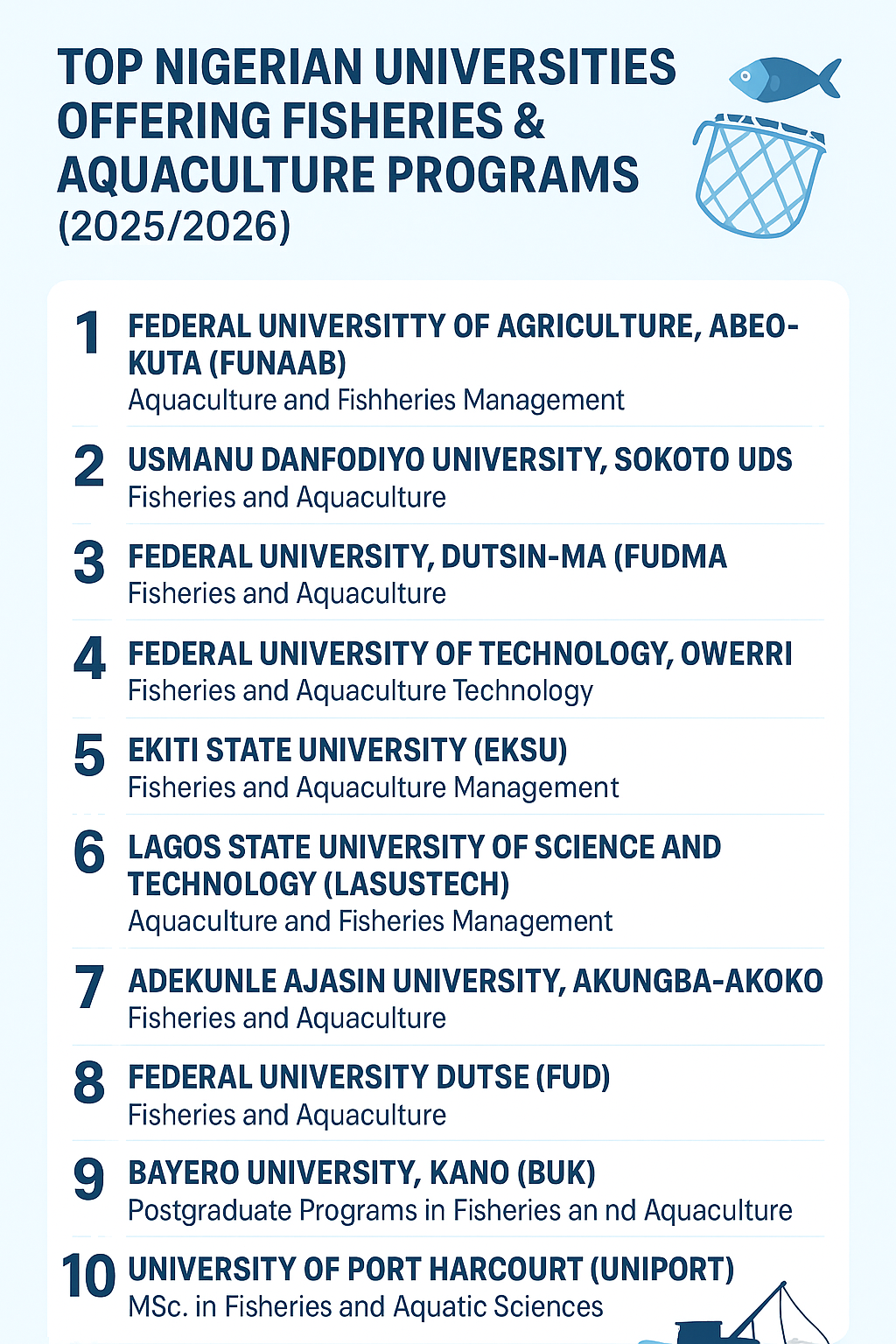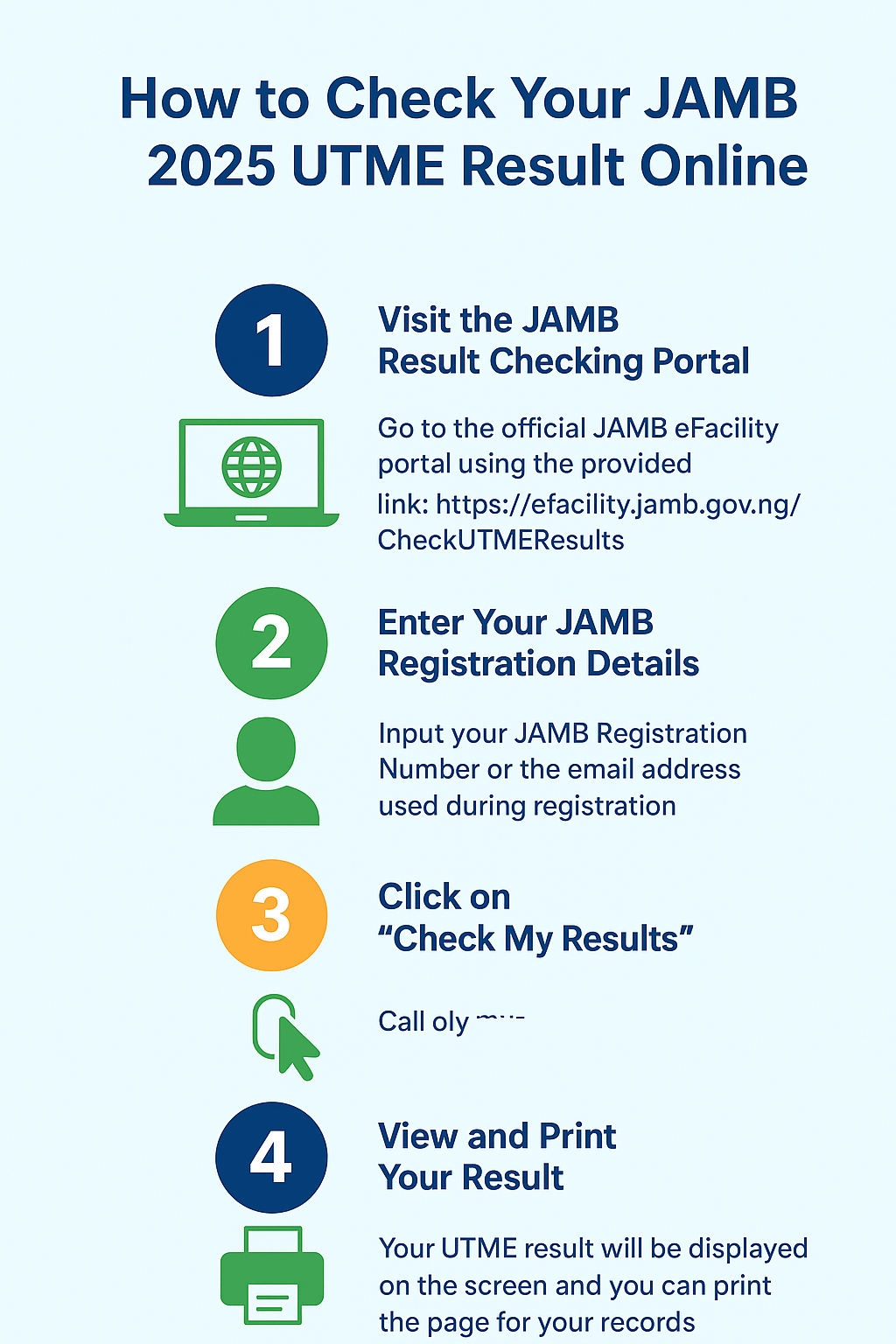Pursuing a degree in Fisheries and Aquaculture is an excellent choice for students passionate about aquatic sciences, sustainable fishing, and the management of aquatic resources. With Nigeria’s growing demand for food security and environmental conservation, this field provides both academic fulfillment and career opportunities in research, farming, and aquaculture technology.
For the 2025/2026 academic session, several universities across Nigeria offer specialized undergraduate and postgraduate programs in Fisheries and Aquaculture. Below is a comprehensive list with details of their unique focus areas.
Contents
- 1. Federal University of Agriculture, Abeokuta (FUNAAB)
- 2. Usmanu Danfodiyo University, Sokoto (UDUSOK)
- 3. Federal University, Dutsin-Ma (FUDMA)
- 4. Federal University of Technology, Owerri (FUTO)
- 5. Ekiti State University (EKSU)
- 6. Lagos State University of Science and Technology (LASUSTECH)
- 7. Adekunle Ajasin University, Akungba-Akoko (AAUA)
- 8. Federal University Dutse (FUD)
- 9. Bayero University, Kano (BUK)
- 10. University of Port Harcourt (UNIPORT)
- Admission Requirements and Cut-Off Marks (2025/2026)
- Why Choose Fisheries and Aquaculture in Nigeria?
1. Federal University of Agriculture, Abeokuta (FUNAAB)
- Program: Aquaculture and Fisheries Management
- Details: Offered under the College of Environmental Resources Management (COLERM), this program trains students in sustainable aquaculture practices and aquatic resource management.
2. Usmanu Danfodiyo University, Sokoto (UDUSOK)
- Program: Fisheries and Aquaculture
- Details: Recognized for its strong teaching and research, UDUSOK aims to be a center of excellence in aquatic sciences and community-driven solutions.
3. Federal University, Dutsin-Ma (FUDMA)
- Program: Fisheries and Aquaculture
- Details: Located in Katsina State, FUDMA offers practical and theoretical training under its Faculty of Agriculture, with emphasis on modern aquaculture technologies.
4. Federal University of Technology, Owerri (FUTO)
- Program: Fisheries and Aquaculture Technology
- Details: FUTO applies a technology-driven approach, integrating advanced research tools and innovation in aquaculture education.
5. Ekiti State University (EKSU)
- Program: Fisheries and Aquaculture Management
- Details: This 5-year program equips students with skills in fish nutrition, pond management, hatchery operations, and aquaculture economics.
6. Lagos State University of Science and Technology (LASUSTECH)
- Program: Aquaculture and Fisheries Management
- Details: Focuses on sustainable fish production, environmental conservation, and the science of aquaculture systems.
7. Adekunle Ajasin University, Akungba-Akoko (AAUA)
- Program: Fisheries and Aquaculture
- Details: Offers comprehensive training combining classroom learning with practical fieldwork in fisheries and aquaculture systems.
8. Federal University Dutse (FUD)
- Program: Fisheries and Aquaculture
- Details: Under its Faculty of Agriculture, FUD emphasizes sustainable resource use and conservation strategies in aquaculture.
9. Bayero University, Kano (BUK)
- Program: Postgraduate Studies in Fisheries and Aquaculture
- Details: BUK’s postgraduate programs focus on advanced research and capacity building in aquaculture and aquatic ecosystem management.
10. University of Port Harcourt (UNIPORT)
- Program: MSc. in Fisheries and Aquatic Sciences
- Details: A postgraduate program designed to build expertise in advanced aquatic science research and fisheries management.
Admission Requirements and Cut-Off Marks (2025/2026)
Admission into Fisheries and Aquaculture programs requires meeting minimum UTME cut-off marks and O’level requirements. Below are sample cut-off marks for some Nigerian universities:
- Nasarawa State University: 160
- Olabisi Onabanjo University: 180
- University of Port Harcourt: 180
- Usmanu Danfodiyo University: 180
- Modibbo Adama University of Technology: 160
- Federal University, Dutsin-Ma: 160
- Kwararafa University: 160
- Rivers State University of Science and Technology: 180
- Ondo State University of Science and Technology: 160
👉 Prospective students should always check the official university websites for updated information on admission requirements, departmental cut-off marks, and application procedures.
Why Choose Fisheries and Aquaculture in Nigeria?
Studying Fisheries and Aquaculture opens up exciting opportunities in:
- Fish farming and aquaculture enterprises
- Research and innovation in aquatic sciences
- Environmental and resource conservation projects
- Food security and agricultural development
Nigeria’s rich water resources make this field highly relevant for tackling unemployment, boosting food supply, and driving economic growth.
✅ Final Takeaway: If you are looking for a course with both career relevance and national importance, Fisheries and Aquaculture is a smart choice. With programs offered across top Nigerian universities, students can gain world-class training in a field that ensures food security and supports sustainable development.



